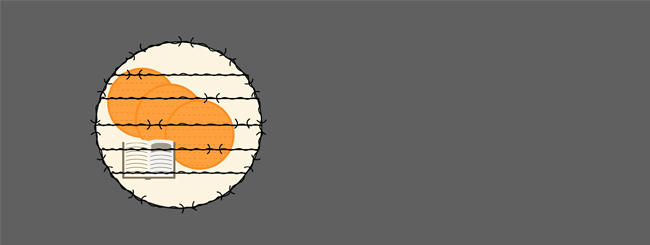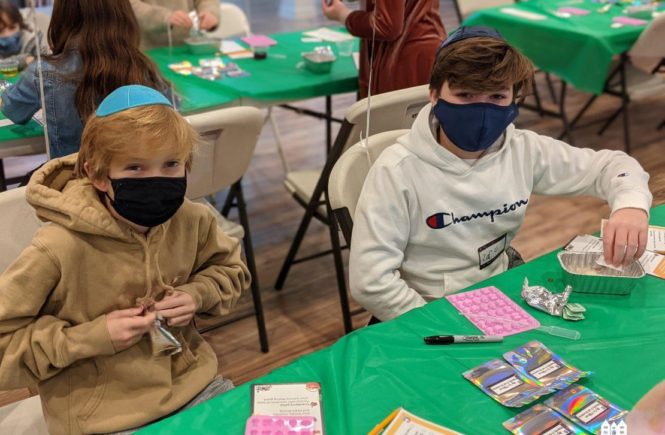We are nine days into quarantine, just over two weeks before Passover, and we are busy squirreling away Passover supplies in the basement. Matzah, paper goods, pots, pans, oil . . . a veritable Passover store has sprung up in the spare bedroom.
Yet, even with a houseful of goods, I cannot tell you that we are comfortable about this Passover. What emotional state will we be in by the time Passover eve arrives? Will the kids have the patience to sit through the Seder? Will the parents?
How can we celebrate our freedom when we are cooped up, prisoners in our own homes, held hostage by an invisible virus?
What kind of Passover will it be? Will it even be Passover?
And then I think of Grandma and The Matzah.
Like us, she is cooped up in her house. Thank G‑d, she is surrounded by loving children and grandchildren (including some who live downstairs from her). Although they are not visiting her, they are dropping off food and other supplies outside her door to make sure she has everything she needs.
Grandma is a childhood survivor of Stalin and Hitler. Some of her earliest memories involve starvation, privation and escape.
There is so much pain and suffering pent up in those formative years that she rarely speaks of them openly. Instead, she channels bits and snippets of them into thinly veiled pieces of fiction.

Grandma with her father and brothers in France, on their way to the U.S.
But there is one anecdote that I have heard from her on many occasions: The Matzah.
That’s right. I just ordered several pounds of matzah to carry our family through the eight-day holiday.
But in Grandma’s childhood, a family was lucky if they got their hands on a single matzah, which they could carefully hide until Passover.
And so it happened one year that Grandma’s father came home with a treasure: a matzah, which he immediately tied up in a clean pillowcase and hung up in a safe place, where neither mice nor neighbors (they lived in a shared apartment) would touch it.
But he didn’t factor in his hungry children.
While her Papa went off to work every day, Grandma and her two brothers sat at home, whiling away the time and trying to stave off the pangs of hunger.
Yes, they were hungry. A recurring fantasy they would enjoy was the pleasure of walking into an entire room filled with loaves of bread, which they could eat, one after another, until they could eat no more.
Now that The Matzah entered their lives, the fantasy took on another dimension. Instead of just talking about eating and feeling the saliva pool in their mouths, they could touch The Matzah through the fine linen pillowcase, running their fingers over its bumpy surface, imagining its crispy, grainy, burnt flavor.
And so the months wore on.
Until Passover finally arrived, and it came time to open the pillowcase. But when that happened, The Matzah was gone. In its place, there was a pile of matzah crumbs, the result of unending “feeling” on the part of three hungry children, who were stuck at home all day in an apartment in central Moscow.
They had nothing. Not a home of their own, not an extra penny to purchase an apple, not even the freedom to worship as Jews. Yet, they celebrated Passover joyously with the little they had.
So as I prepare for Passover, I look back at Grandma’s childhood, and I realize that I have so much to be grateful for.
Yes, my kids are home all day, but they are home because their family and their government are trying to protect them. And their dedicated teachers have provided them with enough online lessons to keep them productive and stimulated all day long.
Yes, we cannot go out and shop as we usually would, but our grocery stores are well stocked (except, of course, if you are looking for toilet paper or eggs), and online delivery services work relatively well.
Yes, we fear what tomorrow may bring, but we live in a loving, kind world, where people are banding together to combat the common enemy, not each other.
But the world is not perfect. Grandma’s mother died during those terrible years in Moscow, perhaps because she had no food, and perhaps because she needed medicine. The fact is she left this world in her twenties, during a time of hardship, and her three little orphans grew up without a mother to shield them from the harsh realities of totalitarianism and war. And the fact is that people are dying right now due to coronavirus.
And that is why we must lift our voices and pray to G‑d that He complete the redemption process He began so many years ago, when He took us out of Egypt. May we merit the coming of Moshiach, who will usher in an era when there will be no more famine, no more suffering and no more illness.
Amen!




